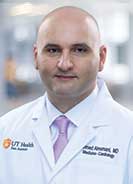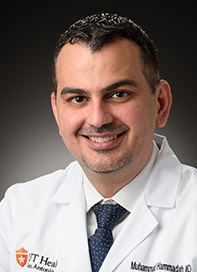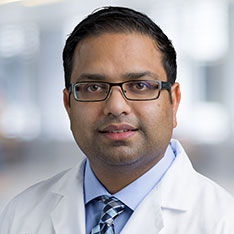Cardiovascular Diseases We Treat
Our heart doctors and surgeons treat common and complex conditions.
Coronary heart disease
Coronary heart disease occurs when the arteries become clogged with plaque. Plaque is a combination of fat, cholesterol and other substances. When plaque clogs the arteries, less oxygen-rich blood can reach the heart.
Heart valve disease
Heart valve disease occurs when one or more of the four valves in the heart don’t work well. The valves have flaps that open and close when your heart beats. If the flaps aren’t working well, blood may leak back in the wrong direction or won't be able to get through. The heart valve diseases we treat include:
- Aortic regurgitation
- Aortic stenosis
- Endocarditis
- Mitral regurgitation
- Mitral stenosis
- Tricuspid regurgitation
- Tricuspid stenosis
Aortic aneurysm and aortic dissection
Aortic aneurysm and aortic dissection can occur when an artery wall becomes weak, and it may bulge out. This can happen in any artery in the body. An aortic aneurysm happens in the aorta, the main artery in the heart. An aortic dissection is when the bulge causes a tear the lining of the aorta.
Arrhythmia
Arrhythmia is also called an irregular heartbeat or abnormal heart rhythm. A disorder of the heart’s electrical system causes this condition. Electricity regulates your heartbeat. When there’s a problem, the heart can beat too quickly, too slowly, or with an irregular rhythm. Atrial fibrillation, or A.Fib, is the most common irregularity.
Heart block
When the electrical connection between the top and the bottom chambers is obstructed, this causes a heart block. A pacemaker can treat advanced degrees of heart block.
Congenital heart defects
Congenital heart defects are heart conditions that some people are born with. There are many types of congenital heart defects, with varying levels of severity.
Our University Children’s Health Heart Center is the only dedicated pediatric heart center in South Texas.
We also have a clinic dedicated to treating adults with congenital heart defects.
Heart failure
Heart failure occurs when the heart can’t pump enough blood to nourish the body. The heart may not be filling with enough blood, or the heart may not pump with enough force. While this is a serious condition, it doesn’t mean your heart has completely stopped working.
Hypertrophic obstructive cardiomyopathy
Hypertrophic obstructive cardiomyopathy happens when the heart muscle walls become too thick. This makes it harder for the heart to pump blood. This genetic condition can block the normal flow of blood from the heart to the rest of the body.
We are a Hypertrophic Cardiomyopathy Association Recognized Center of Excellence.
Peripheral vascular disease
Peripheral vascular disease is also known as peripheral arterial disease. This happens when plaque builds up in the artery and causes a blockage in an artery.
Hereditary heart conditions
We provide comprehensive cardiovascular genetic services including screenings, counseling, referrals and treatment.
Heart Failure
When you learn you have heart failure, the path forward can seem daunting. Our heart failure specialists are here to walk with you down the road to a healthier heart.
Finding the cause of heart failure is the first step toward finding the right treatment. Our heart failure cardiologists will pinpoint the cause using advanced testing. This includes:
- Genetic testing
- Cardiac MRI
- Sleep studies
- Exercise and pharmacologic nuclear stress testing
- Echocardiograms
When we know the cause of heart failure, our team of heart doctors and surgeons work with you on a treatment plan. We'll also help enroll you in our outpatient cardiac rehabilitation program, if needed.

Heart disease is the leading cause of death for both men and women.
Take our quick Heart Health Risk Assessment to understand your risk of heart disease and how to lower it





